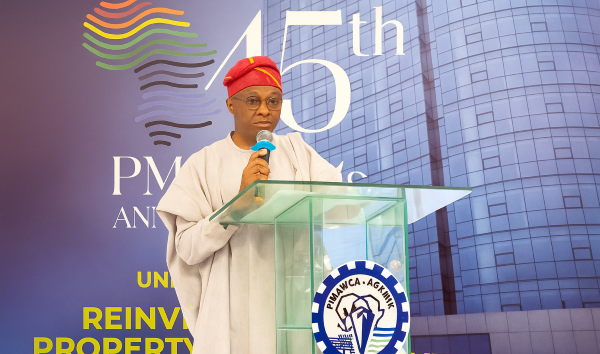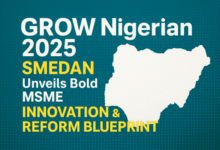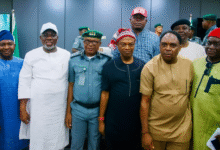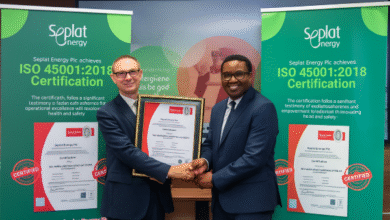
The Managing Director of the Nigerian Ports Authority (NPA) and President of the Port Management Association of West and Central Africa (PMAWCA), Dr. Abubakar Dantsoho, has called for stronger regional collaboration and policy alignment to accelerate Africa’s transition into a competitive, interconnected maritime economy.
Speaking at the closing session of the 45th PMAWCA Annual Council Meeting in Pointe-Noire, Congo, Dantsoho emphasised that the interdependence of African ports makes cooperation—not competition—the most strategic path toward sustainable trade growth, maritime efficiency, and blue economy integration.
Represented by Ikechukwu Onyemekara, NPA’s General Manager, Corporate Affairs, Dantsoho said the shared deliberations and technical sessions at the week-long conference reaffirmed the readiness of West and Central African ports to confront future challenges with innovation and unity.
“I have always envisioned an Africa where our ports collaborate rather than compete. Judging from the quality of ideas and enthusiasm expressed throughout this Council, I am confident that our region’s maritime gateways are poised to face the future with renewed confidence and purpose,” he said.
From Policy to Practice: A Blueprint for Regional Maritime Synergy
Dantsoho stated that resolutions from the PMAWCA Council would shape policy formulation, infrastructure strategy, and government action across member states, providing a clear roadmap for regional maritime transformation.
He noted that in a global environment defined by automation, logistics digitalisation, and green port standards, African ports must evolve as interconnected nodes of a continental logistics network, rather than isolated trade hubs.
“Our geographical and economic realities demand deeper integration. Collective action remains the cornerstone of sustainable port growth, and our ability to implement shared strategies will determine Africa’s competitiveness in the global maritime economy,” Dantsoho added.
He also extended appreciation to the Republic of Congo for hosting the event and commended PMAWCA’s Secretary-General, Mr. Koffi Marie, and the Port of Pointe-Noire management for their coordination.
Unity of Purpose Across African Ports
The NPA boss lauded the directors-general and chief executives of member ports for demonstrating “a unity of purpose that reflects Africa’s emerging confidence in its maritime destiny.”
He assured delegates that the NPA and PMAWCA Secretariat would ensure the implementation of all strategic decisions reached during the conference, describing them as “critical instruments for driving economic prosperity across the continent’s port systems.”
“This convergence of West and Central African expertise to optimise our maritime and demographic endowments will guide future government policies. It will embolden decisive action in trade, infrastructure, and blue economy development,” Dantsoho affirmed.
Quoting the late industrialist Henry Ford, he reminded stakeholders that, “Coming together is a beginning; keeping together is progress; working together is success.”
BRANDECONOMY ANALYSIS: Why Collaboration is Africa’s Maritime Game Changer
The PMAWCA 2025 resolutions highlight a fundamental truth about Africa’s maritime future: no port can thrive in isolation.
With over 90% of Africa’s international trade moving by sea, the continent’s economic competitiveness depends on how efficiently its ports interconnect—digitally, physically, and institutionally.
Experts note that fragmented policies, overlapping regulations, and logistics bottlenecks have cost Africa billions in lost trade opportunities. The shift toward collective action and standardised systems, as championed by Dantsoho, signals a new era of integration in line with the African Continental Free Trade Area (AfCFTA).
The strategic implication is clear: by pooling expertise, harmonising procedures, and investing in smart port infrastructure, Africa can reduce vessel turnaround times, lower shipping costs, and position itself as a maritime powerhouse in global logistics.
For Nigeria, this collaboration aligns with President Bola Tinubu’s Blue Economy Agenda, which seeks to unlock billions in port efficiency, marine trade, and coastal tourism, while reducing dependency on crude oil revenues.
As BRANDECONOMY analysis shows, Dantsoho’s vision of interconnected African ports represents not just a logistics strategy—but a continental call for unity, shared growth, and maritime prosperity.











